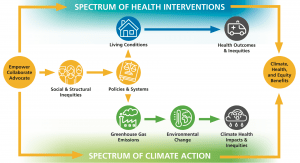Cameron McElmurry’s blog post describes the locust swarms currently ravaging farms in the Horn of Africa. While reading, I recognized the injustice that many face as they experience crises caused by climate change and are forgotten while the world focuses on COVID-19. Worldwide, millions will face food insecurity and depleted agricultural incomes because of disasters such as this.
Cameron’s post reminded me of the “triple inequality” topic discussed in class. In terms of the current climate crises that are affecting the world, developing countries most often take the brunt of the short term effects. The triple inequality concept includes asymmetric impacts (follow the link for examples), responsibility (those who are most affected by climate change often have the least to do with it), and less capacity to adapt (less infrastructure and ability to rebuild or respond to disasters).
Climate change is known to increase inequality, so, as developing countries experience more agricultural failure (droughts, pests, etc.) due to new climate disasters, they will have even less money and resources to make further changes, continuing the cycle of this triple inequality.
Another topic we have discussed in class is the racial disparities present in the food system. A recent article describes the increased inequality of minority Americans during the COVID-19 crisis. It discusses how industrial regions of the country have high populations of minority workers and are disproportionately hit by hurricanes, fossil fuel pollution, cancer and other diseases as result of chemical and pollutant exposure, and now, coronavirus cases. This reveals the reality of triple inequality in America, where particular people groups are systematically affected by the means of production and climate changes that occur as a result of the environmental degradation supported by big business.
It is evident that at home and abroad, we must advocate for those affected by climate change and forgotten during the COVID-19 crisis.


